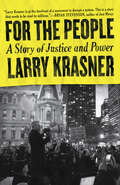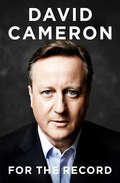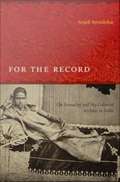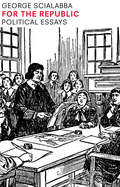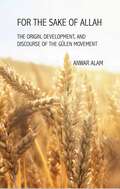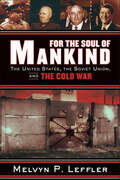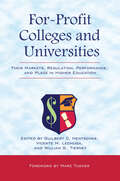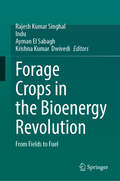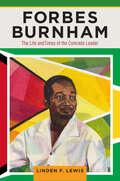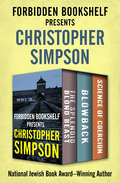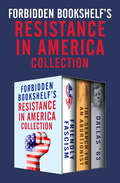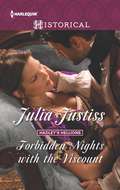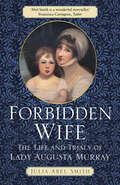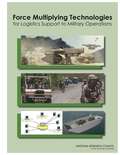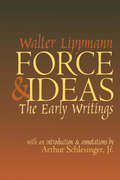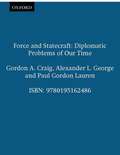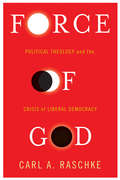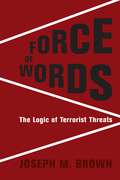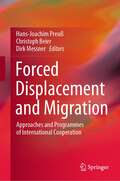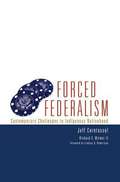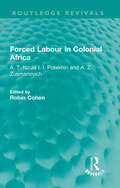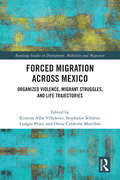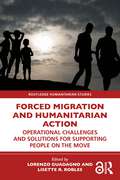- Table View
- List View
For the People: A Story of Justice and Power
by Larry KrasnerPhiladelphia&’s progressive district attorney offers an inspiring vision of how people can take back power to reform criminal justice, based on lessons from a life&’s work as an advocate for the accused.&“Larry Krasner is at the forefront of a movement to disrupt a system. This is a story that needs to be read by millions.&”—Bryan Stevenson, author of Just MercyLarry Krasner spent thirty years learning about America&’s carceral system as a civil rights and criminal defense lawyer in Philadelphia, working to get some kind of justice for his clients in a broken system, before deciding that the way to truly transform the system was to get inside of it. So he launched an unlikely campaign to become the district attorney of Philadelphia, a city known for its long line of notorious &“tough on crime&” DAs who had turned Philly into a city with one of the highest rates of incarceration in the country. Despite long odds and derisive opposition from the police union and other forces of the status quo, Krasner laid out a simple case for radical reform and won the November general election by a margin of nearly 50 percent.For the People is not just a story about Krasner&’s remarkable early life as a defense lawyer and his powerful, grassroots campaign; it&’s also a larger exploration of how power and injustice conspired to create a carceral state unprecedented in the world. Readers follow Krasner&’s lifelong journey through the streets and courtrooms and election precincts of one American city all the way up to his swearing-in ceremony to see how our system of injustice was built—and how we might dismantle it.In the tradition of powerful critiques of the criminal justice system, from Bryan Stevenson&’s Just Mercy to Michelle Alexander&’s The New Jim Crow, For the People makes the powerful case that transforming criminal justice is the most important civil rights movement of our time and can only be done if we&’re willing to fight for the power to make a change.
For the Record
by David CameronA #1 bestseller in England, former Prime Minster David Cameron’s For the Record shares his views on his political career and the state of the UK.David Cameron was elected Conservative leader in 2005, promising to modernize the party following its three successive electoral defeats. He became Prime Minister in 2010, forming Britain’s first coalition government in seventy years, at a moment of economic crisis, and went on to win the first outright Conservative majority for twenty-three years at the 2015 general election.In For the Record, Cameron explains how the governments he led transformed the UK economy while implementing a modern, compassionate agenda that included reforming education and welfare, legalizing gay marriage, honoring the UK’s commitment to overseas aid and spearheading environmental policies. He will shed light on the seminal world events of his premiership—the Arab Spring; the rise of ISIS; the invasion of Ukraine; the conflicts in Libya, Iraq and Syria—as well as events at home, from the Olympic Games in 2012 to the Scottish referendum. He provides his perspective on the EU referendum and his views on the future of Britain’s place in the world following Brexit.Revealing the battles and achievements of his life and career in intimate and frank detail, For the Record is an important assessment of the significant political events of the 2010s, the nature of power and the role of leadership at a time of profound global change.
For the Record: From Wall Street to Washington
by Donald T. ReganThis is a deep and informative study of the inner workings of the Reagan White House, and is based on the thorough notes by the author while he was in the administration.
For the Record: On Sexuality and the Colonial Archive in India
by Anjali ArondekarAnjali Arondekar considers the relationship between sexuality and the colonial archive by posing the following questions: Why does sexuality (still) seek its truth in the historical archive? What are the spatial and temporal logics that compel such a return? And conversely, what kind of "archive" does such a recuperative hermeneutics produce? Rather than render sexuality's relationship to the colonial archive through the preferred lens of historical invisibility (which would presume that there is something about sexuality that is lost or silent and needs to "come out"), Arondekar engages sexuality's recursive traces within the colonial archive against and through our very desire for access. The logic and the interpretive resources of For the Record arise out of two entangled and minoritized historiographies: one in South Asian studies and the other in queer/sexuality studies. Focusing on late colonial India, Arondekar examines the spectacularization of sexuality in anthropology, law, literature, and pornography from 1843 until 1920. By turning to materials and/or locations that are familiar to most scholars of queer and subaltern studies, Arondekar considers sexuality at the center of the colonial archive rather than at its margins. Each chapter addresses a form of archival loss, troped either in a language of disappearance or paucity, simulacrum or detritus: from Richard Burton's missing report on male brothels in Karchi (1845) to a failed sodomy prosecution in Northern India, Queen Empress v. Khairati (1884), and from the ubiquitous India-rubber dildos found in colonial pornography of the mid-to-late nineteenth century to the archival detritus of Kipling's stories about the Indian Mutiny of 1857.
For the Republic: Political Essays
by George ScialabbaEssays and reviews concentrating on politics, economics, sociology and culture. Most of the essays began as book reviews. As book reviews they were superior when published. As essays they are exceptional for their intelligence and clarity. George’s subjects are politics, religion and society. His subject is what people who are thinking ought to be paying attention to. The current cliché is that America has no public intellectuals. Every sentence George writes gives the lie to this bit of lazy journalese.
For the Sake of Allah: The Origin, Development and Discourse of The Gulen Movement
by Anwar AlamFor the Sake of Allah explores the Gülen Movement, also known as Hizmet, a religio-social movement inspired by Fethullah Gülen, one of the most prominent Islamic scholars of Turkish origin in the modern world. Notwithstanding the current purge of Hizmet under the Erdoğan regime, it is one of the most interesting faith-based movements to arise from a Muslim society in the twentieth century. Since the late 1960s, Hizmet has opened thousands of schools around the world and has also contributed to relief efforts in Turkey and abroad.In this book, Anwar Alam shares a decade of research and field work based on the religious, educational, political, and social contexts that have shaped the essential dynamics of both Gülen and the Movement. At a time when the Gülen Movement has been primarily analyzed and debated through the &“state prism&” and &“security discourse,&” especially following the failed Turkish military coup of July 2016, this book takes a longue durée perspective and provides a holistic treatment of Hizmet as essentially a postmodern phenomenon.
For the Soul of Mankind: The United States, the Soviet Union, and the Cold War
by Melvyn P. Leffler“A masterful account of the Cold War by a distinguished historian in full stride.” —G. John Ikenberry, Foreign AffairsTo the amazement of the public, pundits, and even the policymakers themselves, the ideological and political battles that endangered the world for half a century came to an end in 1990. How did that happen? What caused the cold war in the first place, and why did it last as long as it did?To answer these questions, Melvyn P. Leffler homes in on four crucial episodes when American and Soviet leaders considered modulating, avoiding, or ending their global struggle “for the soul of mankind,” and asks why they failed: Stalin and Truman devising new policies after 1945; Malenkov and Eisenhower exploring the chance for peace after Stalin’s death in 1953; Kennedy, Khrushchev, and LBJ trying to reduce tensions after the Cuban Missile Crisis of 1962; and Brezhnev and Carter aiming to sustain détente after the Helsinki Conference of 1975. Leffler then illuminates how Reagan, Bush, and, above all, Gorbachev managed to extricate themselves form the policies and mind-sets that had imprisoned their predecessors, making it possible to reconfigure Soviet-American relations after decades of confrontation.Praise for For the Soul of Mankind“[A] sweeping work . . . Leffler is one of America’s most distinguished cold war historians, and this enlightening, readable study is the product of years of research and reflection.” —Jonathan Rosenberg, The Christian Science Monitor“Leffler has produced possibly the most readable and insightful study of the Cold War yet.” —Publishers Weekly, (starred review)“Professor Leffler has the benefit of almost two decades of hindsight as well as access to recently declassified American and Soviet documents. The result is a series of fresh and often provocative perspectives on the struggle.” —Booklist
For-Profit Colleges and Universities: Their Markets, Regulation, Performance, and Place in Higher Education
by Vicente M. Lechuga William G. Tierney Guilbert C. HentschkeDo for-profit colleges and universities (FPCUs) pose a threat to traditional providers of higher education, or do they play a vital role at a time when the capacity of public and private non-profits to meet demand is constrained? With the US no longer the leader in developing a college-educated workforce, can FPCUs help redress the competitive gap? What can be learned from the management practices and growth of FPCUs – that now number close to 3,000 institutions in the US – whose increase in enrollments has out-paced that of traditional institutions, and who now grant around 8% of all degrees? This book offers a clear-eyed and balanced analysis of for-profit colleges and universities, reviewing their history, business strategies, and management practices; setting them in the context of marketplace conditions, the framework of public policy and government regulations; and viewing them in the light of the public good.Individual chapters variously explore FPCU’s governance, how they develop courses and programs, and the way they define faculty work; present findings from in-depth interviews with part-time and full-time faculty to understand how external forces and the imperative of profit generation affect faculty roles and responsibilities of faculty; analyze policy considerations that affect FPCUs, including federal regulation and oversight, accountability and assessment, and the legal and regulatory issues FPCUs face internationally; and finally address the notion of academic freedom and the distribution of public monies to FPCUs. Looking beyond FPCUs’ current strategy of offering career programming to non-traditional students, the book reveals how they are positioning themselves to meet future market needs by developing new programs targeting a wider group of students.Recognizing that FPCUs are more developing than fully developed, the authors convey both the current state and the unresolved issues facing these businesses, and, in so doing, surface enduring topics that face all of post-secondary education.
Forage Crops in the Bioenergy Revolution: From Fields to Fuel
by Rajesh Kumar Singhal Ayman El Sabagh Indu Krishna Kumar DwivediThis book delves into the popular "Food vs. Fuel" arguments and examines the complicated interplay between biofuel and agricultural markets. It provides information on forage crops as potential third-generation sources of bioenergy, and their cultivation practices. The areas covered include methodologies to enhance production efficiency of bioenergy, metabolism involved in cellulosic ethanol production, influence of policy and technical implementation, and the consequent impact on biofuels. The discussion of current difficulties impeding the expansion of the cellulosic biofuel business, as well as potential solutions are discussed as well. This book also covers case studies describing the present biofuel policies and its consequences on both the energy as well as agricultural sectors, as well as analysis of the current and growing biofuel market. The gathered information in the book is an excellent source for phenotyping, trait improvement, and developing future crop stress-management strategies and models. Students, scientists, policymakers, and investors in the bioenergy business will find this book to be a useful resource. Also, it serves as an excellent reference book for agriculturists, plant scientists, climatologists, and research scholars.
Forbes Burnham: The Life and Times of the Comrade Leader (Critical Caribbean Studies)
by Linden F. LewisIt is virtually impossible to understand the history of modern Guyana without understanding the role played by Forbes Burnham. As premier of British Guiana, he led the country to independence in 1966 and spent two decades as its head of state until his death in 1985. An intensely charismatic politician, Burnham helped steer a new course for the former colony, but he was also a quintessential strongman leader, venerated by some of his citizens yet feared and despised by others. Forbes Burnham: The Life and Times of the Comrade Leader is the first political biography of this complex and influential figure. It charts how the political party he founded, the People’s National Congress, combined nationalist rhetoric, socialist policies, and Pan-Africanist philosophies. It also explores how, in a country already deeply divided between the descendants of African slaves and Indian indentured servants, Burnham consolidated political power by intensifying ethnic polarizations. Drawing from historical archives as well as new interviews with the people who knew Burnham best, sociologist Linden F. Lewis examines how his dictatorial tendencies coexisted with his progressive convictions. Forbes Burnham is a compelling study of the nature of postcolonial leadership and its pitfalls.
Forbidden Bookshelf Presents Christopher Simpson: The Splendid Blond Beast, Blowback, and Science of Coercion (Forbidden Bookshelf)
by Christopher SimpsonThree provocative exposés from a National Jewish Book Award–winning journalist address the CIA&’s recruitment of Nazis and use of psychological warfare. The Splendid Blond Beast: This groundbreaking investigation into the CIA&’s post–World War II liberation and recruitment of Nazi war criminals—including the pivotal role played by CIA director Allen Dulles—traces the roots not only of US government malfeasance, but of mass murder as an instrument of financial gain and state power, from the Armenian genocide during World War I to Hitler&’s Holocaust through the practice of genocide today. &“Revelatory and shocking.&” —Kirkus Reviews Blowback: The true story of how US intelligence organizations employed Nazi war criminals in clandestine warfare and propaganda against the USSR, anticolonial revolutionaries, and progressive movements worldwide that were claimed to be Soviet pawns. &“The story is one that needs to be told, and Blowback makes a major contribution to its telling, supplementing a thorough collation of known cases with ample new research.&” —The New York Times Science of Coercion: Drawing on long-classified documents from the Pentagon, the CIA, and other national security agencies, Simpson exposes secret government-funded research into psychological warfare and reveals that many of the most respected pioneers in the field of communication science were knowingly complicit as their findings were employed for the purposes of propaganda, subversion, intimidation, and counterinsurgency during the Cold War era. &“An intriguing picture of the relations between state power and the intellectual community.&” —Noam Chomsky, Massachusetts Institute of Technology
Forbidden Bookshelf's Resistance in America Collection: Friendly Fascism, The Search for an Abortionist, and Dallas '63 (Forbidden Bookshelf)
by Peter Dale Scott Nancy Howell Lee Bertram GrossFrom creeping capitalism to abortion to government corruption, these three books shed light on controversial topics that are too often left in the dark. Curated by NYU professor Mark Crispin Miller, the Forbidden Bookshelf series resurrects books from America&’s repressed history. All touching on bold and debated topics, these three books are more relevant today than ever. Friendly Fascism: Bertram Gross, a presidential adviser in the New Deal era, explores the insidious way that capitalist politics could subvert America&’s constitutional democracy. First published over three decades ago, this book predicted the threats and realities that occur when big business and big government become bedfellows, while demonstrating how US citizens can build a truer democracy. The Search for an Abortionist: Nancy Howell Lee&’s eye-opening account reveals the dangerous and illegal options for women seeking an abortion before Roe v. Wade. Based on interviews with 114 women, this groundbreaking work takes an intimate look at the abortion process. Dallas &’63: Peter Dale Scott exposes the deep state, an intricate network within the American government, linking Wall Street influence, corrupt bureaucracy, and the military-industrial complex. Since World War II, its power has grown unchecked, and nowhere has it been more apparent than at Dealey Plaza on November 22, 1963. Scott details the CIA and FBI&’s involvement in the JFK assassination, and shows how events like Watergate, the Iran–Contra affair, and 9/11 are all connected to this behind-the-scenes web of corruption.
Forbidden Love in St. Petersburg: A Thriller
by Mishka Ben-David&“Convincing tradecraft, coupled with a plausible look at the inner life of a spy with a license to kill, will remind readers of the best of John le Carré.&” —Publishers Weekly (starred review) Yogev Ben-Ari has been sent to St. Petersburg by the Mossad, ostensibly to network and set up business connections. His life is solitary, ordered, and lonely—until he meets Anna. Neither is quite what they seem to be, but while her identity may be mysterious, there is no doubt about the love they feel for each other. But the impassioned affair is not part of the Mossad plan. The agency must hatch a dark scheme to drive the lovers apart. Soon what began as a quiet, solitary mission becomes a perilous exercise in survival, and Ben-Ari has no time to discover the truth about Anna&’s identity before his employers act . . . &“The novel has a solid sense of intrigue and suspense, and its depiction of the world of international espionage feels accurate (as it should, since the author is a former Mossad agent). The characterizations are precise, too: these aren&’t stick figures in a spy story but real people in a real environment. A nice blend of classic spy-novel conventions with a thoroughly contemporary setting.&” —Booklist (starred review)
Forbidden Nights with the Viscount (Hadley's Hellions #1)
by Julia JustissAway from society's prying eyes... After suffering the loss of her beloved husband, quick-witted Lady Margaret Roberts has sworn off the pursuit of passion...that is, until she meets Giles Hadley. Bitterly estranged from his family, reluctant viscount Giles knows all too well the devastation of an unhappy marriage. So while he is prepared to indulge in an illicit affair, he must beware, for spirited Maggie awakens in him something even more forbidden-the desire to claim her as his wife!
Forbidden Wife: The Life and Trials of Lady Augusta Murray
by Julia Abel SmithOn the night of 4 April 1793, two lovers were preparing to compel a cleric to perform a secret ceremony. The wedding of the sixth son of King George III to the daughter of the Earl of Dunmore would not only be concealed – it would also be illegal.Lady Augusta Murray had known Prince Augustus Frederick for only three months but they had already fallen deeply in love and were desperate to be married. However, the Royal Marriages Act forbade such a union without the King’s permission and going ahead with the ceremony would change Augusta’s life forever. From a beautiful socialite she became a social pariah; her children were declared illegitimate and her family was scorned.In Forbidden Wife Julia Abel Smith uses material from the Royal Archives and the Dunmore family papers to create a dramatic biography set in the reigns of Kings George III and IV against the background of the American and French Revolutions.
Force Multiplying Technologies for Logistics Support to Military Operations
by Committee on Force Multiplying Technologies for Logistics Support to Military OperationsThe mission of the United States Army is to fight and win our nation's wars by providing prompt, sustained land dominance across the full range of military operations and spectrum of conflict in support of combatant commanders. Accomplishing this mission rests on the ability of the Army to equip and move its forces to the battle and sustain them while they are engaged. Logistics provides the backbone for Army combat operations. Without fuel, ammunition, rations, and other supplies, the Army would grind to a halt. The U. S. military must be prepared to fight anywhere on the globe and, in an era of coalition warfare, to logistically support its allies. While aircraft can move large amounts of supplies, the vast majority must be carried on ocean going vessels and unloaded at ports that may be at a great distance from the battlefield. As the wars in Afghanistan and Iraq have shown, the costs of convoying vast quantities of supplies is tallied not only in economic terms but also in terms of lives lost in the movement of the materiel. As the ability of potential enemies to interdict movement to the battlefield and interdict movements in the battlespace increases, the challenge of logistics grows even larger. No matter how the nature of battle develops, logistics will remain a key factor. "Force Multiplying Technologies for Logistics Support to Military Operations" explores Army logistics in a global, complex environment that includes the increasing use of antiaccess and area-denial tactics and technologies by potential adversaries. This report describes new technologies and systems that would reduce the demand for logistics and meet the demand at the point of need, make maintenance more efficient, improve inter- and intratheater mobility, and improve near-real-time, in-transit visibility. "Force Multiplying Technologies" also explores options for the Army to operate with the other services and improve its support of Special Operations Forces. This report provides a logistics-centric research and development investment strategy and illustrative examples of how improved logistics could look in the future.
Force and Ideas: The Early Writings
by Walter LippmannThe acclaim for Lippmann the political thinker has at times obscured the equally impressive accomplishments of Lippmann the journalist. His output was prodigious, his influence on journalism significant. According to James Reston: "He has given a generation of newspapermen a wider vision of their duty." Early Writings provides a unique opportunity to rediscover this journalistic Lippmann and to observe the formative years of a brilliant mind.In 1913, just three years out of Harvard, Lippmann was asked by Herbert Croly to help plan and edit a new "weekly of ideas," the New Republic. Beginning with its first issue in 1914 and continuing through the following six years, Lippmann wrote numerous signed and unsigned articles. Here are the best of them, written during the exciting political era that began with the trauma of World War I and ended in the stasis of Republican Normalcy.Pulitzer Prize-winning historian, Arthur Schlesinger, Jr., places Lippmann in historical context while recreating the intellectual ambiance of the Wilsonian era. His annotations identify little-remembered personages and clarify issues that time has befogged. But in another sense, the issues and personages of 1910-1920 are only too familiar. Our world is still a world of war, ineffectual international political organizations, disappointed idealism, nerve-wracking platitudes, social unrest, and slinking politicians.
Force and Statecraft: Diplomatic Challenges of Our Time (Fourth Edition)
by Paul Gordon Lauren Gordon A. Craig Alexander L. GeorgePart One focuses upon the historical context of force and statecraft. Following a completely new Introduction, it ranges from a substantially restructured discussion of the early techniques, instruments, and ideas of diplomacy to the profoundly dangerous changes brought about by contemporary weapons of mass destruction and terrorism. Chapters cover the emergence of the Great Powers, the classical system of diplomacy, the diplomatic revolution, the creation of the United Nations, the rise and fall of the Cold War, globalization and the consequences of the Internet, and events as recent as 9/11, the Bush Doctrine, the "war on terrorism" and the American-led war in Iraq, nuclear proliferation in Iran and North Korea, and the World Summit of global leaders. Significant new material is added to this edition on the critical subject of human rights and its relationship to international peace and security. Part Two begins with the completely new and pivotal chapter on the subject of "Lessons of History and Knowledge for Statecraft." Each subsequent chapter then proceeds to systematically examine an especially important and challenging subject in diplomacy by means of delineating its theoretical principles and then analyzing three very specific historical cases in equal detail. The first of these always is drawn from the classical system of the nineteenth century, and the other two follow in a progression toward increasingly more recent events in contemporary international affairs. Particular care has been taken in this edition to include a number of new cases that reveal the truly global dimensions of these diplomatic challenges and thus range from Europe and the United States to the Middle East and Asia. Part Three opens with an entirely new chapter entitled "Ethics and Other Restraints on Force and Statecraft." This explores practical, structural, and political restraints upon policy makers; the debate over the nature of ethics and international politics; ethical restraints in foreign policy; and the difficult matter of observing ethical restraints, such as those of just war tradition, in warfare itself. A completely rewritten and updated Conclusion brings the major themes of the book together and offers a number of reflections about history, theory, the diplomatic revolution, and challenges ahead.
Force of God: Political Theology and the Crisis of Liberal Democracy (Insurrections: Critical Studies in Religion, Politics, and Culture)
by Carl RaschkeFor theorists in search of a political theology that is more responsive to the challenges now facing Western democracies, this book tenders a new political economy anchored in a theory of value. The political theology of the future, Carl Raschke argues, must draw on a powerful, hidden impetus—the "force of God"—to frame a new value economy. It must also embrace a radical, "faith-based" revolutionary style of theory that reconceives the power of the "theological" in political thought and action.Raschke ties democracy's retreat to the West's failure to confront its decadence and mobilize its vast spiritual resources. Worsening debt, rising unemployment, and gross income inequality have led to a crisis in political representation and values that twentieth-century theorists never anticipated. Drawing on the thought of Hegel and Nietzsche as well as recent work by Michel Foucault, Jacques Derrida, Jean-Joseph Goux, Giorgio Agamben, and Alain Badiou, among others, Raschke recasts political theology for a new generation. He proposes a bold, uncompromising critical theory that acknowledges the enduring significance of Marx without his materialism and builds a vital, more spiritually grounded relationship between politics and the religious imaginary.
Force of Words: The Logic of Terrorist Threats (Columbia Studies in Terrorism and Irregular Warfare)
by Joseph M. BrownTerrorist groups attain notoriety through acts of violence, but threats of future violence are just as important in attaining their political goals. Force of Words is a groundbreaking examination of the role of threats in terrorist strategies. Joseph M. Brown shows how terrorists use threats, true and false, to achieve key outcomes such as social control, economic attrition, and policy concessions. Brown demonstrates that threats are integral to terrorism on a tactical level as well, distracting security forces, drawing police into traps, and warning civilians out of harm’s way when terrorists seek to limit casualties.Force of Words reorients the field of terrorism studies, prioritizing the symbolic, psychological dimension that makes this form of conflict distinctive. It expands the study of terrorist propaganda by detailing how militants tailor their threats to send the desired political message. Drawing on rich interview data, quantitative evidence, and case studies of the IRA, ETA, the Tamil Tigers, Shining Path, the Túpac Amaru Revolutionary Movement, Boko Haram, the Afghan Taliban, and ISIL, the book offers practical guidance for interpreting terrorists’ threats and assessing their credibility. Force of Words is essential reading for anyone seeking to understand the logic of terrorism.
Forced Displacement and Migration: Approaches and Programmes of International Cooperation
by Christoph Beier Dirk Messner Hans-Joachim PreußThis book presents effective long-term solutions for displacement and migration against the background of the current debates. It offers insights on practical suggestions for dealing with displacement and migration due to violence, examines ideas for the management of global migration movements and looks into the integration of refugees and migrants. Throughout the chapters, experts from science, politics and practice shed light on the causes of global migration and the consequences of migration on a political, economic and social level. The focus of the discussion is not the avoidance of migratory movements, but above all the use of positive effects in countries of origin, transit and destination.The book is a must-read for researchers, policy-makers and politicians, interested in international cooperation and in a better understanding of causes, consequences and solutions of displacement and forced migration.
Forced Federalism: Contemporary Challenges to Indigenous Nationhood (American Indian Law and Policy Series Volume #3)
by Jeff Corntassel Richard C. WitmerOver the past twenty years, American Indian policy has shifted from self-determination to “forced federalism,” as indigenous nations in the United States have encountered new threats from state and local governments over such issues as taxation, gaming, and homeland security. During the forced federalism era (1988–present), public perceptions of indigenous peoples as “rich Indians” have been just as damaging to Native nations as anti-sovereignty legislation. This book examines how state governments have manipulated “rich Indian” images when setting policies targeting indigenous peoples and discusses how indigenous nations have responded politically to these contemporary threats to their nationhood. Drawing on original survey data collected from Native governments from 1994 to 2000 and on interviews with Chief Chad Smith of the Cherokee Nation as well as other indigenous leaders, Jeff Corntassel and Richard C. Witmer II examine the power dynamics of the indigenous-state compacting system, and show how electoral activism among indigenous peoples has increased their political power while also giving rise to “rich Indian racism” among non-Indians—especially in the wake of the Indian Gaming and Regulatory Act. The authors warn that current widespread Native participation in non-Native politics is undermining both the political and the cultural foundations of indigenous nationhood, especially as the American culture of money gains influence in Native politics. They also offer specific strategies for regenerating indigenous communities in order to meet future challenges to their nationhood.
Forced Labour in Colonial Africa: A. T. Nzula I. I. Potekhin and A. Z. Zusmanovich (Routledge Revivals)
by Robin Cohen Hugh Jenkins A. T. Nzula I. I. Potekhin A. Z. ZusmanovichOriginally published for the first time in English in 1979 this book represents one of the earliest Marxist analyses of the impact that colonialism had on Africa during the first half century that followed the Scramble. Nzula’s co-authored book, together with all his writings in the Negro Worker, are assembled here. The political experience of its African co-author resulted in a book which is alight with commitment to the liberation of the Continent, yet always tempered by an explicit theoretical understanding of capitalism in its imperialist phase. The book opens with an outline of Africa’s role in the world economic system. Successive chapters reveal how Western capitalism conjured up a brutally exploited working class and dispossessed peasantry throughout the African continent. Each major region of Black Africa is analysed. Meticulous information as to the facts of oppression and many of the early urban and rural struggles against colonialism before the Second World War is set out. Robin Cohen’s introduction is a valuable summation of Nzula’s life and of the background to this book. The appendices bring together many of Nzula’s little known writings.
Forced Migration across Mexico: Organized Violence, Migrant Struggles, and Life Trajectories (Routledge Studies in Development, Mobilities and Migration)
by Ludger Pries Stephanie Schütze Ximena Alba Villalever Oscar Calderón MorillónThis book analyzes the different ways in which forced migration comes together with organized violence in the Americas, focusing specifically on the migration corridor from Central America, through Mexico and on to the United States. No matter their starting point, most South and Central American migrants to the United States must eventually traverse Mexico, and often many other borders beforehand, to reach their destination. As border controls tighten, for many migrants turning back is not a possibility, or something they desire. And so, when faced with hardening policies, migrants are often forced into situations of increased violence and precarity, without a shift in their ultimate objective. This book analyzes the complex social situations of everyday violence, and increasingly aggressive border controls, which face migrants in Mexico, as well as their exposure to a different kind of violence during their migration trajectory through the criminal actors such as gangs, cartels, and corrupt law enforcements that seek to make a profit from them. The book takes a critical approach on migration policies and on the externalization of borders by analyzing their effects on the trajectories and experiences of migrants themselves. It shows that the more migrants’ opportunities and rights during transit are hindered, the more they are at risk of exposure to these actors. Foregrounding the voices of migrants, this book offers fresh insights into debates surrounding migration, politics, international relations, and anthropology in the Americas.
Forced Migration and Humanitarian Action: Operational Challenges and Solutions for Supporting People on the Move (Routledge Humanitarian Studies)
by Lorenzo Guadagno Lisette R. RoblesForced population movements are a defining feature of almost any humanitarian crisis, shaping the design, targeting, and delivery of emergency responses.This book investigates how the evolving situation of different forced migrants is accounted for and addressed in humanitarian action in order to improve their access to support and assistance. Bringing together case studies from Africa, Asia, Europe, and the Pacific, this book focuses on a diversity of operational modalities and types of assistance provided by both traditional and non-traditional humanitarian actors to address the specific needs of displaced children, women, people with disabilities and older people, as well as trafficked migrant workers.This book adopts a broad perspective on humanitarian action, acknowledging how its boundaries are challenged and expanded in forced migration contexts. Its operational and theoretical insights will be useful for a range of readers, from humanitarian and migration researchers and students to practitioners and policymakers.
